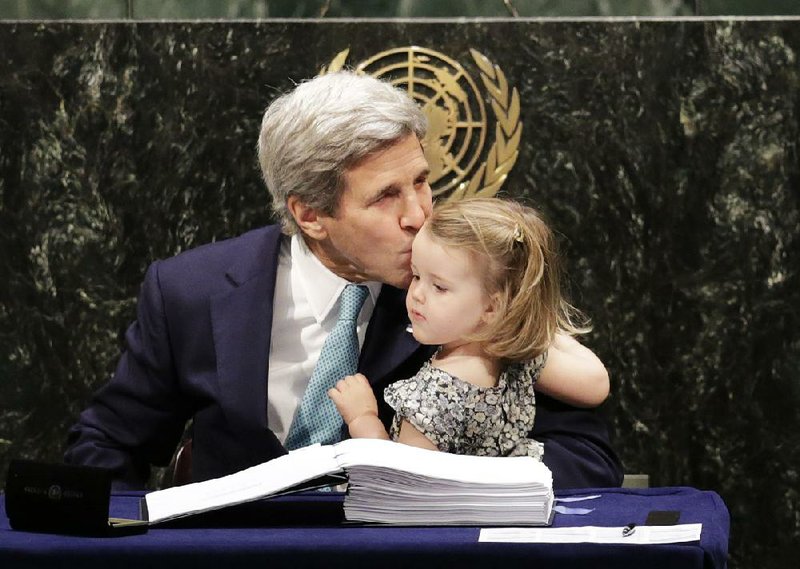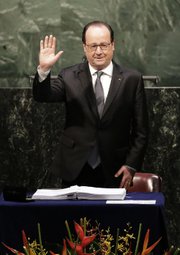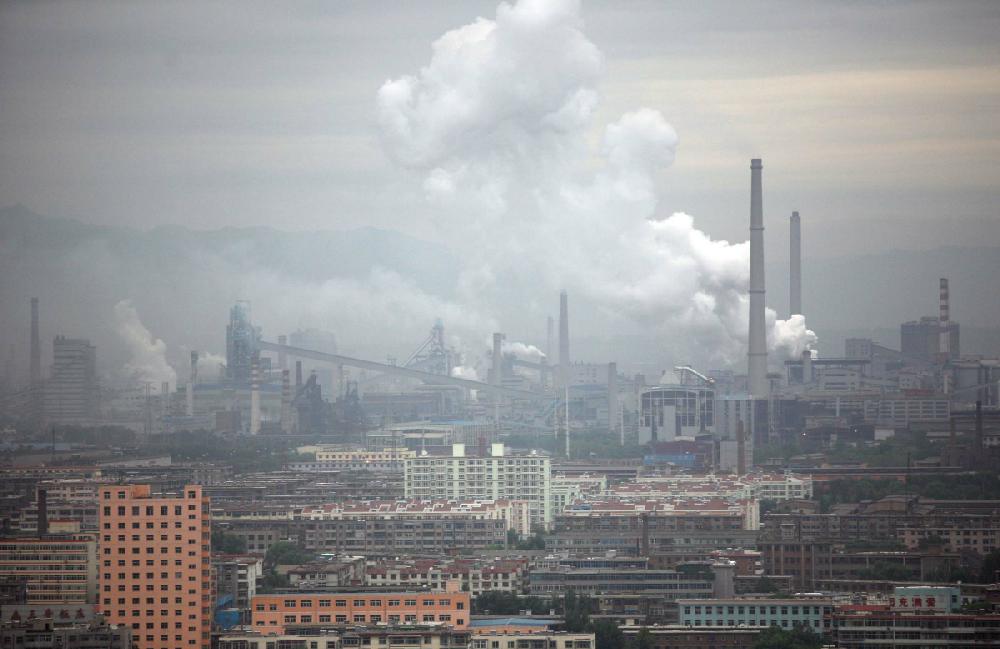UNITED NATIONS -- Leaders from 175 countries signed the Paris Agreement on climate change Friday as the landmark deal took a key step forward, potentially entering into force years ahead of schedule.
The event, at United Nations headquarters in New York, coincided with Earth Day and marked "the largest number of countries ever to sign an international agreement in a single day," said U.N. Secretary-General Ban Ki-moon.
U.S. Secretary of State John Kerry, holding his young granddaughter, joined dozens of world leaders for a signing ceremony that set a record for international diplomacy: Never have so many countries signed an agreement on the first available day. Nations that didn't sign Friday have a year to do so.
Many now expect the climate agreement to enter into force long before the original deadline of 2020. Some say it could happen this year.
"We are breaking records in this chambers, and this is good news. But there are also records being broken outside," Ban said, referring to temperatures in the first three months of 2016 that were the highest on record. "We are in a race against time. ... The era of consumption without consequences is over."
Other events tied to climate change also have triggered sharp concern globally: Greenland's large ice sheet has experienced more melting this spring than researchers have ever seen. Coral reefs known for their eye-catching colors are turning white in warming seas, with the Great Barrier Reef experiencing unprecedented bleaching right now.
"This is a day to commit ourselves to actually winning this war," Kerry stressed in his remarks near the end of the event's opening ceremony. "Nature is changing due to our choices."
The power of the climate accord, Kerry noted, is the message it sends to the private marketplace to make sustainable goods and technology to battle global warming. "What it's going to do is unleash the private sector," he said.
After signing, countries must formally approve the Paris Agreement through their domestic procedures. The United Nations says 15 countries, several of them small island states under threat from rising seas, did that Friday by depositing their instruments of ratification.
China, the world's top carbon emitter, announced that it will "finalize domestic procedures" to ratify the Paris Agreement before the G-20 summit in China in September. Ban immediately welcomed the pledge.
China's climate envoy, Xie Zhenhua, said his government hopes the United States will join the climate agreement "as soon as possible."
Kerry said the United States "absolutely intends to join" and ratify the agreement this year.
President Barack Obama's administration faces a difficult fight with members of Congress to implement the U.S. greenhouse gas reduction goals.
Many Republican lawmakers remain skeptical about whether human activity is causing climate change -- despite overwhelming consensus by the world's leading scientists -- or whether the planet is even warming long-term.
U.S. Sen. James Inhofe, R-Okla., has said the declaration by the U.N. International Panel on Climate Change "proves that the U.N. is more interested in advancing a political agenda than scientific integrity."
In February, the Supreme Court issued a stay on the Environmental Protection Agency's Clean Power Program, an effort to control greenhouse-gas emissions under the Clean Air Act. The stay means the EPA cannot take industry cleanup actions at least until challenges are resolved in lower courts.
'trillions of dollars'
Ban warned that the work ahead will be enormously expensive. "Far more than $100 billion -- indeed, trillions of dollars -- is needed to realize a global, clean-energy economy," he said.
The agreement will enter into force once 55 countries representing at least 55 percent of global emissions have formally joined it.
An analysis by the Washington-based World Resources Institute found that at least 25 countries representing 45 percent of global emissions joined the agreement Friday or committed to joining it early.
French President Francois Hollande, the first to sign the agreement, said Friday that he will ask Parliament to ratify it by this summer. France's environment minister is in charge of global climate negotiations.
"There is no turning back now," Hollande told the gathering.
Other countries that said Friday that they intend to join the agreement this year include Mexico, Australia and Canada.
Canadian Prime Minister Justin Trudeau drew a large round of applause when he declared that developed nations such as his, the U.S. and those in the European Union are responsible for much of the emissions that drive climate change and should therefore help poor nations that are mostly suffering as a result.
"Canada's ambition cannot end at home" with its own actions to curb carbon dioxide levels and other emissions, Trudeau said. "We have a role to play with poor nations, too. They should not be punished for something they did not do."
The largest round of applause followed the appearance of award-winning actor Leonardo DiCaprio, a vocal and longtime environmental advocate who was among the last speakers. DiCaprio compared climate change to the overriding crisis of Abraham Lincoln's time, slavery.
"Yes, we have achieved Paris," DiCaprio said, addressing the politicians and officials before him. DiCaprio urged leaders to fight for the accord in the absence of a mandate to enforce it. "It will mean nothing if you return to your countries and fail to push beyond the promises of this agreement," he said.
After 21 years of meetings, talks and debates, DiCaprio said, the time for talk is over. "Our planet will not be saved unless we leave fossil fuels in the ground where they belong."
The climate ceremony brought together a wide range of states that on other issues might sharply disagree. North Korea's foreign minister made a rare U.N. appearance to sign Friday, and Zimbabwe's President Robert Mugabe drew applause when he declared, "Life itself is at stake in this combat. We have the power to win it."
Countries that have not yet indicated they would sign the agreement Friday include some of the world's largest oil producers, such as Saudi Arabia, Iraq, Nigeria and Kazakhstan, the World Resources Institute said.
challenges ahead
The Paris Agreement was reached in December as a major breakthrough in U.N. climate negotiations, which for years were slowed by disputes between rich and poor countries over who should do what.
Under the agreement, countries set their own targets for reducing emissions of carbon dioxide and other greenhouse gases. Countries must update their pledges every five years.
The agreement, however, comes with no mechanism compelling governments to fulfill their pledges, however. Like Obama, other heads of state face determined opposition against expensive regulations.
Already, nations worldwide face pressure to do more to counter global warming. Scientific analyses show the initial set of targets that countries pledged before Paris don't match the agreement's long-term goal to keep global warming below 2 degrees Celsius -- about 3.6 degrees Fahrenheit -- compared with preindustrial times. Global average temperatures already have climbed by almost 1 degree Celsius.
The latest analysis by the Climate Interactive research group shows the Paris pledges put the world on track for 3.5 degrees Celsius of warming. A separate analysis by Climate Action Tracker, a European group, projected warming of 2.7 degrees Celsius.
Either way, scientists say the consequences could be catastrophic in some places, wiping out crops, flooding coastal areas and melting Arctic sea ice.
As the Paris Agreement moves forward, there is some good news. Global energy emissions, the biggest source of man-made greenhouse gases, were flat last year even though the global economy grew, according to the International Energy Agency.
Still, fossil fuels are used much more widely than renewable sources like wind and solar power.
Information for this article was contributed by Edith M. Lederer and Cara Anna of The Associated Press and by Darryl Fears of The Washington Post.
A Section on 04/23/2016


